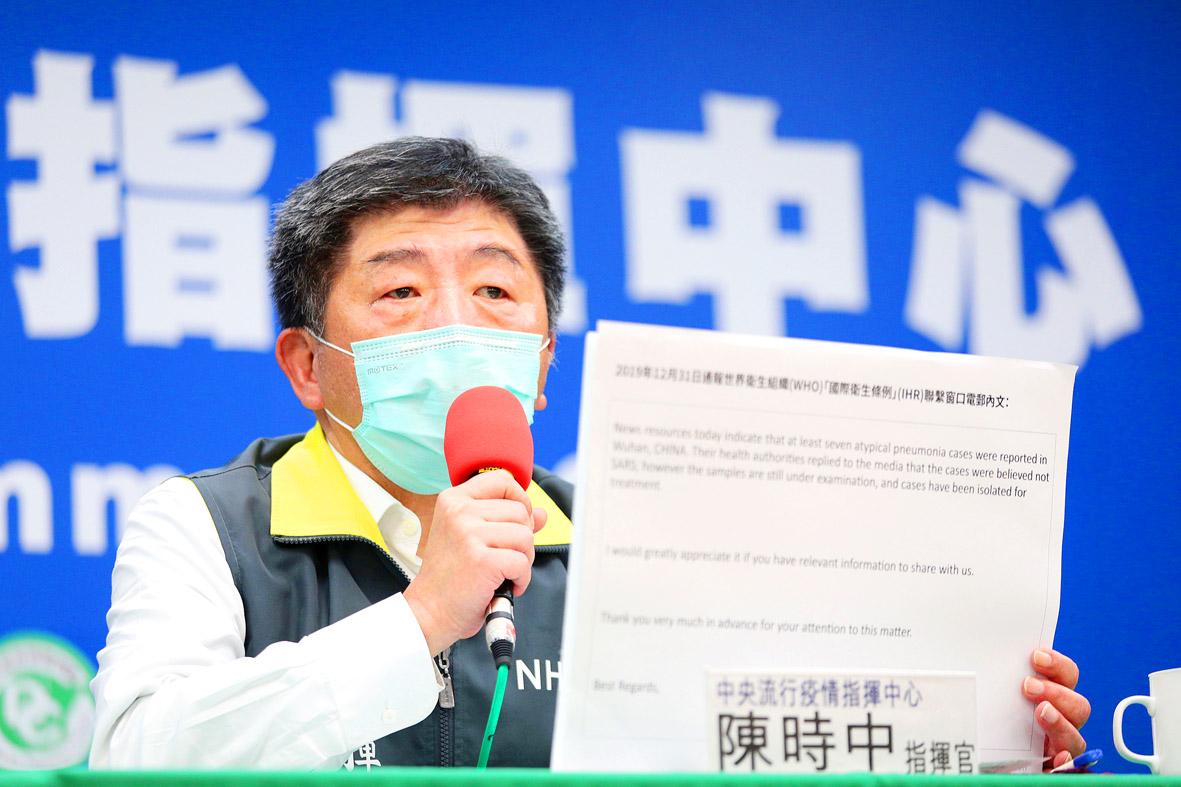Minister of Health and Welfare Chen Shih-chung (陳時中) yesterday urged the WHO to be honest as the Central Epidemic Command Center (CECC) published the e-mail it had sent to the world body in December last year alerting it about the risk of an outbreak in China.
The WHO on Friday said it received an e-mail from the Ministry of Health and Welfare on Dec. 31 last year, but added that “there was no mention in the message of human-to-human transmission.”
During a news conference at the CECC in Taipei yesterday, Chen read out the Centers for Disease Control’s (CDC) e-mail to the WHO International Health Regulations (IHR) Focal Point on Dec. 31 last year.

Photo: CNA
“News resources today indicate that at least seven atypical pneumonia cases were reported in Wuhan, China,” the e-mail read. “Their health authorities replied to the media that the cases were believed not SARS; however, the samples are still under examination, and cases have been isolated for treatment.”
“I would greatly appreciate it if you have relevant information to share with us. Thank you very much in advance for your attention to this matter,” it added.
China commonly uses the term “atypical pneumonia” to refer to SARS, but Chinese authorities had been ambiguous in describing the novel coronavirus as “an atypical pneumonia, but not SARS.”
“The e-mail specifically noted that patients had been isolated for treatment,” Chen said. “Any public health expert or medical professional would know what circumstances would require patients to be isolated for treatment.”
As there were no confirmed cases in Taiwan at the time, the CDC could not definitively state that there had been human-to-human transmission of the disease, he added.
“We would really be giving a misleading message if we firmly stated that there was human-to-human transmission, so we clearly alerted the IHR about the information we received,” he said.
“If our warning to the WHO that the patients were ‘isolated for treatment’ does not count as a warning, than what does?” Chen said.
“While Taiwan, a non-member state, has informed the WHO, I would like to ask whether China, a WHO member, had informed the WHO about the situation?” Chen said, adding that if China did not alert the WHO at the time, then it had been concealing the truth about COVID-19, and if China did alert the WHO, then the WHO has neglected its duty in warning the world.
Chen urged the WHO to be honest in dealing with the issue and stop trying to shift the focus.
The CECC in a news release said that the IHR Focal Point only responded with a short message stating that Taiwan’s information had been forwarded to experts.
Taiwan strongly suspected that human-to-human transmission was already occurring at the time, but could not confirm it, so enhanced border control and quarantine measures were implemented based on the assumption, including screening passengers on flights from Wuhan prior to disembarkation starting on Dec. 31 last year, the release said.
The CDC also sent experts to Wuhan in January to gain a better understanding of the outbreak, patients’ exposure history and the control measures taken there, it added.

SECURITY: As China is ‘reshaping’ Hong Kong’s population, Taiwan must raise the eligibility threshold for applications from Hong Kongers, Chiu Chui-cheng said When Hong Kong and Macau citizens apply for residency in Taiwan, it would be under a new category that includes a “national security observation period,” Mainland Affairs Council (MAC) Minister Chiu Chui-cheng (邱垂正) said yesterday. President William Lai (賴清德) on March 13 announced 17 strategies to counter China’s aggression toward Taiwan, including incorporating national security considerations into the review process for residency applications from Hong Kong and Macau citizens. The situation in Hong Kong is constantly changing, Chiu said to media yesterday on the sidelines of the Taipei Technology Run hosted by the Taipei Neihu Technology Park Development Association. With

CARROT AND STICK: While unrelenting in its military threats, China attracted nearly 40,000 Taiwanese to over 400 business events last year Nearly 40,000 Taiwanese last year joined industry events in China, such as conferences and trade fairs, supported by the Chinese government, a study showed yesterday, as Beijing ramps up a charm offensive toward Taipei alongside military pressure. China has long taken a carrot-and-stick approach to Taiwan, threatening it with the prospect of military action while reaching out to those it believes are amenable to Beijing’s point of view. Taiwanese security officials are wary of what they see as Beijing’s influence campaigns to sway public opinion after Taipei and Beijing gradually resumed travel links halted by the COVID-19 pandemic, but the scale of

A US Marine Corps regiment equipped with Naval Strike Missiles (NSM) is set to participate in the upcoming Balikatan 25 exercise in the Luzon Strait, marking the system’s first-ever deployment in the Philippines. US and Philippine officials have separately confirmed that the Navy Marine Expeditionary Ship Interdiction System (NMESIS) — the mobile launch platform for the Naval Strike Missile — would take part in the joint exercise. The missiles are being deployed to “a strategic first island chain chokepoint” in the waters between Taiwan proper and the Philippines, US-based Naval News reported. “The Luzon Strait and Bashi Channel represent a critical access

Pope Francis is be laid to rest on Saturday after lying in state for three days in St Peter’s Basilica, where the faithful are expected to flock to pay their respects to history’s first Latin American pontiff. The cardinals met yesterday in the Vatican’s synod hall to chart the next steps before a conclave begins to choose Francis’ successor, as condolences poured in from around the world. According to current norms, the conclave must begin between May 5 and 10. The cardinals set the funeral for Saturday at 10am in St Peter’s Square, to be celebrated by the dean of the College